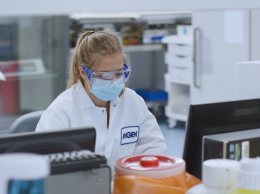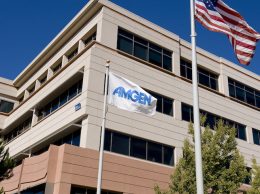The Food and Drug Administration approved Amgen’s Humira biosimilar Sept. 23.
Amjevita, formerly known as ABP 501 and made by Thousand Oaks-biotech giant Amgen, replicates the effects of Humira, which is approved to treat nine conditions including rheumatoid arthritis, skin disorders and colon inflammation.
Humira, made by Chicago-based competitor AbbVie, typically costs $20,000 per year for treatments. Sales of the drug were $14 billion last year.
The FDA approved the copycat version of Humira to treat rheumatoid arthritis, psoriatic arthritis, arthritis that affects the spine, Crohn’s disease, ulcerative colitis and plaque psoriasis in adults. Kids at least four years old may also be treated using the drug for idiopathic arthritis.
The drug is the first Amgen biosimilar to be approved by the FDA and the fourth by any pharmaceutical since the FDA began approving biosimilars in 2015.
The most serious known side effects with Amjevita are infections and malignancies. The most common expected adverse reactions with Amjevita are infections and injection site reactions, the FDA said in a news release.
“The FDA’s approval of Amjevita is based on review of evidence that included structural and functional characterization, animal study data, human pharmacokinetic and pharmacodynamics data, clinical immunogenicity data and other clinical safety,” the FDA said in a news release.
Biosimilars, like Amjevita, are designed as lower cost treatments and similar to generics but are made with living organisms and aren’t identical to the complex compounds they replicate. Because the compounds are not identical, extensive testing must still take place to ensure their safety, which does not lower the cost of the drugs as much as generics.
The approval is a major blow for AbbVie, but not an unexpected one. In July, an FDA panel recommended the drug for approval — so marketing approval was seen as a formality. The FDA also found in July that the drug effectively replicated the effects of Humira.
Amjevita may not hit pharmacies immediately, though. Amgen said previously it plans to launch the drug by 2018. AbbVie contends it holds uninfringeable patents on the drug until 2022, but a key patent expires later this year.
The approval of Amjevita comes about a month after the FDA approved a copycat version of Amgen’s Enbrel and allowed a competitor to take a shot at it.
Made by Switzerland-based Novartis, Erelzi mimics the effects of Enbrel. Enbrel, which was first approved in 1998, is approved to treat rheumatoid arthritis and other conditions by decreasing the amount of a protein produced by the immune system.
With sales of $5.3 billion last year, Enbrel made up about 20 percent of Amgen’s $21.6 billion in revenue.
Amgen is currently developing eight other biosimilars. Drugs treating breast cancer and lung cancer are currently in Phase 3 trials. Biosimilars treating non-Hodgkin’s lymphoma, Crohn’s Disease and head and neck cancer are also in development.
This post was updated from its original version.
• Contact Philip Joens at pjoens@pacbiztimes.com.






 Print
Print Email
Email

















